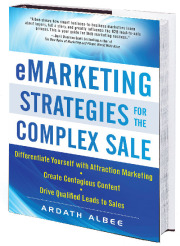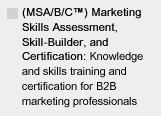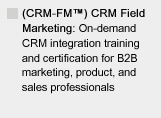MAKE SURE YOU CONTINUE TO RECEIVE EACH ISSUE OF TUESDAY MARKETING NOTES—CLICK HERE TO RENEW YOUR FREE SUBSCRIPTION (IF YOU'VE ALREADY SUBSCRIBED, NO NEED TO RE-SUBSCRIBE)

Solicit Sales Feedback Marketers Can Use
Ardath Albee, Marketing Interactions
Effective B2B eMarketing strategies must be built on knowledge—not gut instinct. The foundational knowledge that should drive all strategies must start with your prospects, buyers and customers. One of the best places to uncover this information is to—hold your breath—talk to your sales people.
The gathering and use of feedback seems to be a lost skill set and consistently rides very low on the totem pole of priorities. But, it shouldn't. It should be where marketers start and what you circle the wagons around on a regular basis.
Marketing is responsible for a lot of stuff. The thing about all the "stuff" is that it is all pointed toward customer acquisition and revenue production orchestrated by sales people. So why in the world so few marketers ever talk to sales people, let alone solicit the appropriate feedback, is a mystery.
Marketers who ignore the wealth of information sales people can provide that will help them improve the results they produce are shooting themselves in the foot (or worse places).
For marketers who want to improve their contribution to revenues, their relationships with the prospects they find it so hard to engage and their accountability to their companies, start by creating a feedback protocol to guide your efforts.
Suggestions for the type of knowledge you'll want to gather include:
What questions prospects are asking sales people?
• Are these questions that marketing could help to answer earlier in the buying process?
• Does the salesperson have content to use in answer to the questions?
• If it was determined that a prospect had the question top of mind, would it indicate an appropriate opportunity to involve sales?
Which content we give them is usable as is?
• Can salespeople use the content we give them as is?
• Which content are they recreating?
• Do they revise it solely for personalization reasons? How?
• Or must they redevelop it because it doesn't suit late-stage needs?
Are prospects as qualified as marketers think their score indicates?
• Did marketing pass the prospect to sales at the appropriate time?
• Too early? Were they unresponsive to sales communications?
• Too late? Were competitors already in the conversation?
• Suggestions for better indications of sales readiness?
What was the result of the initial meeting?
• How many attempts did it take to get the initial meeting?
• What next steps were agreed to?
What else in addition to what marketing provided does sales need at the handoff?
• Richer profiles;
• Detailed activity history;
• Continuing storyline approaches based on interest;
• Introduction to connect the prospect to the salesperson
What surprised the salesperson the most about the prospect conversation?
• Was the prospect well educated on our offerings?
• Did they have a clear idea of how our company could help them?
• Did any false assumptions exist with the prospect?
Who else is involved in the purchase decision?
• Based on who else, is the salesperson moving up, down or sideways within the organization?
• What types of questions, requirements do the additional people have?
• Is their influence critical enough that a marketing program should be established to target their needs?
What slide(s) did they wish they had in their deck at their last presentation?
• Are there slides marketing could provide that would improve the sales rep's conversation and make meeting preparation easier?
What are the obstacles to moving forward?
• Can the obstacles be removed with education, expertise or specific evidence that our company delivers what we promise?
• Does the obstacle suggest that the prospect would be better served by being returned to a nurturing program?
The above questions and considerations are only a few ideas of feedback that marketing could solicit from sales to help them improve their work in generating high-quality leads worthy of sales pursuit.
By establishing a feedback protocol, marketing will be closer to measuring apples to apples and identifying improvements and areas that could be shifting for prospects that they need to refine. If the feedback requested from sales is not consistent, then it will be hard to know if progress is being made or if the adjustments marketing makes in response to the feedback are really working.
However, it's not just about generating sales-ready leads. It's about ensuring that your sales people have the content, collateral and tools they need to keep the momentum going. It's about maximising their time in sales conversations, not reinventing the materials marketing gives them or spending hours researching prospects instead of serving them.
Marketing can have a huge impact on sales success. If they put the effort into providing what sales needs, not just what they "think" they should provide.
Introducing Ardath Albee's New Book,
eMarketing Strategies for the Complex Sale

|
A comprehensive guide to help marketers drive decisions to buy in their favor.
Power your eMarketing results by mastering how to:
• Build a foundation for eMarketing strategies based on buyer perspectives;
• Use a buyer synopsis to develop personalized content;
• Transform prospect engagement with natural nurturing;
• Create a contagious content structure for competitive differentiation;
• Generate increased pipeline with attraction marketing;
• Facilitate faster prospect progression to sales readiness;
• Perfect the transition of sales-ready leads to your sales force;
• Measure the impact of eMarketing programs against business objectives
To visit this book's Web site, click here . . . |
Ardath Albee (Ardath@marketinginteractions.com) is an expert at creating contagious content and e-marketing strategies that engage prospects-from initial attention until they're sales ready. She has a unique ability to develop content strategies that work hand-in-glove with overall corporate and product positioning to deliver hard hitting e-marketing programs and tools that compel customers to buy. Ardath helps her clients generate more opportunities by optimizing how they leverage marketing automation and CRM technology investments. Her clients include Covad Communications, LANDesk and Silicon Graphics. Visit her website and industry-leading blog to learn more: www.marketinginteractions.com.









